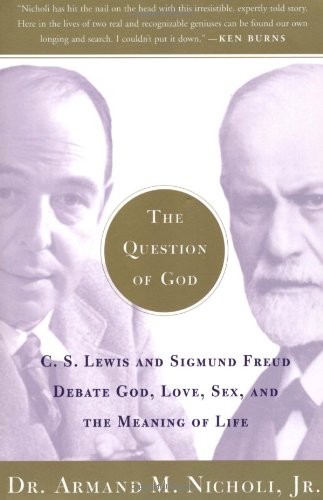The
Prologue opens with their funerals – a couple of quotes from
attendees, snippets and summaries from their obituaries, and a brief
montage of their accomplishments. A tasty appetizer to prime the
palate for the entrée to come.
The
lives of these two intellectual icons
overlapped in both space and time: Freud lived “not far from
Oxford” where, and while, Lewis was a young professor, and the two
were separated only by a generation; Lewis' body was buried just 24
years after Freud's was cremated. Both wrote passionately and
extensively about their philosophies, and the two shared an interest
in literature and psychoanalysis. They published several books,
including autobiographies.
Nicholi
sets out to address two fundamental questions “What should we
believe?” and “How should we live?” He examines Freud's and
Lewis' childhoods, their relationships with their families, the
historical events that impacted their personal and professional
lives, and the philosophies they espoused based
not only on their published works but on the less public thoughts
contained in the journals they kept and the hundreds of letters they
wrote to friends and family. More (maybe most) importantly,
the writer explores whether these men practiced what they preached,
and, subsequently, whether their lives were enriched.
Both
Freud and Lewis experienced heart wrenching tragedies and deep
sorrows. Nicholi draws from their letters to expose these wounds.
Their deaths near the close of the work, though anticipated, came too
soon and made me scrunch my face and clumsily wipe my cheeks.
Detractors
have expressed displeasure with Nicholi's conclusions. Some insist
the pairing of the two men is unfair to Freud, that Nicholi stacks
the deck against atheism, that instead Lewis should've been pitted
against the likes of Sam Harris or Carl Sagan.
These
objections ignore several factors, some I've already mentioned. Maybe
most relevant is what Nicholi says in the Prologue:
Wherever Freud raises an argument, Lewis attempts to answer it.
Thirty years before the publication of this book in 2003, Harvard invited Nicholi to teach a
course on Freud. He has been teaching the undergraduates there ever since, as well as the Harvard Medical School students for at least a decade. Initially, the
course consisted exclusively of Freud's philosophical views, but as
Nicholi writes:
Roughly half my students agreed with him, the other half strongly disagreed. When the course evolved into a comparison of Freud and Lewis, it became much more engaging, and the discussions ignited.
We
should also remember that Freud gave us “terms such as ego,
repression, complex, projection, inhibition,
neurosis, psychosis, resistance, sibling
rivalry, and Freudian slip.” Lewis was
“perhaps the 20th century's most popular proponent of
faith based on reason” and inspired a “vast number of ...
societies in colleges and universities”.
During World War II his Broadcast talks made his voice second only to Churchill's as the most recognized on the BBC.
It's
difficult to downplay “the sheer quantity of personal,
biographical, and literary books and articles on Lewis” published
since his passing.
Despite
Sagan's highly entertaining Cosmos series, his important work
in astronomy and astrophysics, as well as his compelling commentary
as it pertains to cosmology, his influence doesn't compare. As for
Harris' haphazard reasoning and saccharin science, anyone who believes
this atheist would stand a chance against the likes of Lewis is
engaged in wishful thinking. A brief sampling of online video or audio debates
between Harris and a number of theist philosophers and scientists
confirms this. Critical thinking is not his forte.
I
can't imagine a skeptic coming away from this work still convinced
atheism has anything attractive to offer. Freud's philosophy led to
fits of depression and repeated thoughts of suicide; Lewis' faith
resulted in personal fulfillment so that even at his most desperate
and lonesome hour, he discovered not only an alternative to despair
but a joy that surpassed his expectation.
A
compelling account of two legends, their legacies, and the
implication and consequence of their philosophies. Well written and
researched (40 pages of notes and bibliography).




No comments:
Post a Comment